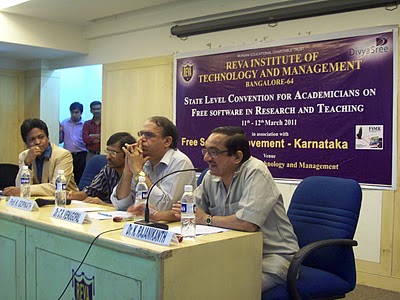“We dont want to be a Nero’s guest” is what everyone had to say when around 130 people from various parts of Bangalore gathered to raise voice against Farmer suicides. It included software professionals, research scholars, students, professors and state government employees. All of them could have continued doing what they did on their weekends i.e. party with their friends, visit amazing places near Bangalore or just watch a movie and sleep. But they chose not to because how much ever you ignore it, you can not just feel it right to enjoy a happy life with your neighbours committing suicide. Especially when it is for around the same amount that you spend for your family on a weekend.
Just our saying that “We dont want to be a Nero’s guest” doesnt change anything. It wont bring the 200,000 farmers who have already committed suicide and it wont change the policies to stop more farmer suicides. But what it does is to let the government know that they cannot just get away with this. We cannot any more have the policies in favour of the minority of the people in name of development and let the majority starve to death. It is a perfect recipe to disaster and sooner or later we will trigger it if we dont do anything to change the current scenario.
As planned, we started the protest march at 5 pm from Mysore Bank Circle with around 60 people each holding a banner. We did manage to get the attention of the people who were travelling on the road and distributed the pamphlets too. Hope atleast some would have read them and will contact us back and join us in this cause. We raised slogan against the current reduction in silk import tax from 30.66% to 5% and the anti farmers policies that the both central government and state government having been imposing in every budget. We reached Town Hall at around 5:45 where around 40-50 people were already sitting with banners.
At the town hall, we started with a street play depicting the inequality between an engineer living in an urban area and a farmer. An engineer gets atleast a call per day informing him of the various loans that he can avail to buy luxury items which can be sanctioned to him without any security. Where as the same banks do not have any money to lend to farmers who have been working hard in the fields but do not have security for the banks. The play depicted the current scenario perfectly where in politicians are happy to subsidize electricity to malls in the cities on the cost of cut offs and load sheding for more than half of a day in villages. With banks and politicians giving no heed to the voices of the distressed farmers, they are forced to borrow money from wealthy money lenders in villages at an exorbitant rate of interest of minimum of 36% and which can go as high as 120%. With all doors closed the farmers are left with little choice but committing suicides, hoping they will not be reborn atleast as a farmer in their next life.
After the street play, Senthil gave a brief introduction of how the idea of conducting the vigil had come up and why it was such an important event. He thanked all the participating organizations like AID Bangalore, ITEC, Sugathi, Concern and many more. He represented the people who had all gathered when he said that we were all ashamed to face someone like Shri Boregowda who had lost his son and daughter-in-law due to the policies of the government that favoured us. He also mentioned the pathetic condition of the current media which had not covered the farmers suicides.
After his talk, Senthil asked Shri Bore Gowda to come and speak a few words. He explained to everybody how both his son and his daughter-in-law were already in debt but were planning to clear the debt with the good production they had this season. However the sudden fall of cocoon prices became the trigger for them to take such a drastic step. The sad grand-father who had been left with 3 grand-children had only the future of his grand-children in mind. He requested everybody to come forward and help to give a good life to his grand-children. He also told how many local government authorities had visited them and promised compensation but none of whom had actually dispatched any amount till now.
After this, Mr. Krishna Gowda, a sericulture activist from Mandya, gave us the complete picture of the impact of the import tax reduction. Though the government currently has decreased the silk import tax in pretext of the move to help the silk weavers, he told us that it hardly actually helps the weavers. It actually help the bosses of the rich bosses of the weavers who will now be making huge profits. He told that the price fall happened due to the anticipation of the fall of silk price when the actual policy will be implemented from April 1st. Anticipating the fall of silk price, the dealers in the market emptied their stocks of silk thus causing such a huge crash in silk price. He mentioned that how both central govt and state govt had completely ignored the matter. If only the state government had inject money to support the price of the silk, such a fall in price could have been averted. He also mentioned that the actual repercussion of the reduction in silk import will be seen when Chinese silk will enter Indian market with the meagre 5% import tax. This, he warned us, will actually lead to many more suicides if not acted upon immediately.
This was soon followed by a talk by B. Suresh, a popular director who is known to make more sensible kannada movies than his counterparts who believe in making movies with just songs and masalas. With twilight dawning, we simultaneously started the candle lighting event with Shri Bore Gowda lighting the first candle. Soon we had more than 100 candles lighting to show the solidarity for all the farmers who have committed suicide and to let all the farmers living that their neighbours in the city for whom they have been tilling the field and feeding with their hard work will do their best to help them lead a happy life.
With atleast, TV 9 and Samaya NEWS channel covering the event and reporters from The Hindu, we hope to see at least this burning issue of Farmer suicides reaching the National pages of the news papers and Breaking News tags of TV NEWS channels. However, one thing is sure, we are not going to stop and this is just the beginning. A group of people will be soon visiting the affected villages and understand the ground reality which will then help us to actually think of some concrete steps that we can take to help these sericulture farmers.
Do contact us if you would like to join us and help us end up eating the very own hands that feed us. We are reachable at,
http://www.itecentre.co.in/node/18
You can keep yourself updated about this issue by following the wiki page that we have created, http://farmer-suicide-and-it.wikispaces.com/


